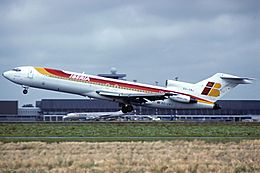Iberia Airlines Flight 610 facts for kids

An Iberia Boeing 727-200 similar to the one involved
|
|
| Accident summary | |
|---|---|
| Date | 19 February 1985 |
| Summary | Controlled flight into terrain due to pilot error |
| Place | Mount Oiz, Biscay, Spain 43°13′43″N 02°35′24″W / 43.22861°N 2.59000°W |
| Passengers | 141 |
| Crew | 7 |
| Fatalities | 148 |
| Survivors | 0 |
| Aircraft type | Boeing 727–256 |
| Aircraft name | Alhambra de Granada |
| Airline/user | Iberia |
| Registration | EC-DDU |
| Flew from | Madrid–Barajas Airport, Spain |
| Flying to | Bilbao Airport, Spain |
Iberia Airlines Flight 610 was a flight from Madrid to Bilbao, Spain. On February 19, 1985, the Boeing 727-200 airplane crashed. It hit a mountain near Bilbao. Sadly, all 148 people on board died in the accident.
Contents
What Happened?
The Flight
Iberia Flight 610 was a regular passenger flight. It took off from Madrid–Barajas Airport in Spain. Its destination was Bilbao Airport. The airplane was a Boeing 727-200, named "Alhambra de Granada." There were 141 passengers and 7 crew members on board.
The Crash
As the plane got closer to Bilbao, it began its landing approach. The weather was cloudy and foggy. The plane was flying over a mountainous area. Suddenly, the aircraft hit the top of Mount Oiz. This mountain is located in the Biscay region of Spain. The crash happened at 9:09 AM local time.
Why Did It Happen?
Investigators looked into what caused the crash. They found that the main reason was a mistake by the pilots. This is called "pilot error." The plane was flying too low. It was below the safe altitude for that area. This type of accident is known as a "controlled flight into terrain" (CFIT). This means the pilots were in control of the plane, but they accidentally flew it into the ground or a mountain.
The pilots did not realize how close they were to the mountain. This might have been due to poor visibility. It could also have been because of confusion about their exact position. The plane's warning systems did not alert them in time.
After the Accident
Investigation and Findings
After the crash, a detailed investigation began. Experts from Spain and the United States worked together. They studied the flight recorders. These are like black boxes that record flight data and cockpit voices. The investigation confirmed that the plane was flying too low. It was below the minimum safe altitude. The crew had not followed the correct procedures for approaching the airport.
This accident led to important changes. Airlines and air traffic control improved safety rules. They focused on better pilot training. They also worked on improving warning systems in airplanes. The goal was to prevent similar accidents in the future.
See also
 In Spanish: Vuelo 610 de Iberia para niños
In Spanish: Vuelo 610 de Iberia para niños
 | Precious Adams |
 | Lauren Anderson |
 | Janet Collins |

